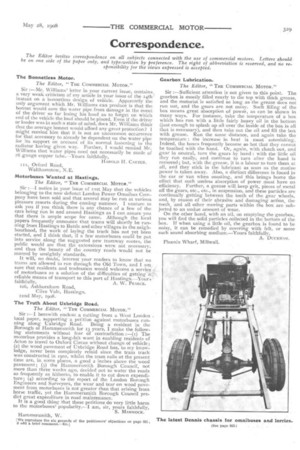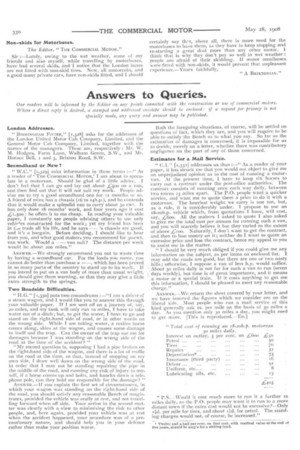Correspondence.
Page 15

Page 16

If you've noticed an error in this article please click here to report it so we can fix it.
The Editor invites correspondence on all subjects connected with the use of commercial motors. Letters sltould be on one side of the paper only, and type-written by preference. The right of abbreviation is reserved, and no responsibility for the views expressed is accepted.
The Bonnetless Motor.
The Editor, "Ti-is COMMERCIAL MOTOR."
Sir :—Mr. Williams' letter in your current issue, contains a very weak criticism of my article in your issue of the tg.th instant on a bonnetless design of vehicle. Apparently the only argument which Mr. Williams can prodttce is that the bonnet would save the water pipe from damage in the event of the driver so far losing his head as to forget on which end of the vehicle the load should be placed. Even if the driver or loader was in such a state of mind, does Mr. Williams think that the average bonnet would afford any great protection? I might remind him that it is not an uncommon occurrence for that accessory to already be dependent on the water pipe for its support on accountof its normal fastening to the radiator having given way. Further, I would remind Mr_ Williams that water pipes need not necessarily be made of 26 gauge copper tube.—Yours faithfully,
HAROLD H. CARTER.
I' Orford Road,
Walthamstow, N.E.
Motorbuses Wanted at Hastings.
The Editor, " THE COMMERCIAL MOTOR."
Sir :—I notice in your issue of 21st May that the vehicles belonging to the now defunct London Power Omnibus Company have been sold and that several may be run at various pleasure resorts during the coming summer. I venture to ask you if you think there is any chance of a few of the cars being run in and around Hastings as I can assure you that there is ample scope for same. Although the local papers frequently announce that trams will shortly be running from Hastings to Battle and other villages in the neighbourhood, the work of layingthe track has not yet been started, and I think that, if a few motorbuses could be put into service along the suggested new tramway routes, the public would see that the extensions were not necessary, and thus the beauty of the country roads would not be marred by unsightly standards,
It will, no doubt, interest your readers to know that no trams are allowed to run through the Old Town, and I am sure that residents and tradesmen would welcome a service of motorbuses as a solution of the difficulties of getting a reliable means of transport to this part of Hastings.—Your., faithfully, A. W. PEARCE. 106, Ashburnham Road, 'Clive Vale, Hastings. 22nd May, 1908.
The Truth About Uxbridge Road.
The Editor, "THE COMMERCIAL MOTOR."
Sir :—I herewith enclose a cutting from a West London local paper, supporting a petition against motorbuses running along Uxbridge Road. Being a resident in the Borough of Hammersmith for 13 years, I make the following statements without fear of contradiction :—(1) The motorbus provides a long-felt want in enabling residents of Acton to travel to Oxford Circus without change of vehicle; (2) the wood pavement of Uxbridge Road has, to my knowledge, never been completely relaid since the tram track was constructed in too2, whilst the tram rails at the present time are, in some places, a good 2 inches above the wood pavement; (3) the Hammersmith Borough Council, not more than three weeks ago, decided not to water the roads so frequently as hitherto, to enable it to cut down expenditure; (4) according to the report of the London Borough Engineers and Surveyors, the wear and tear on wood pavement from motorbuses is not greater than that arising from horse traffic, yet the Hammersmith Borough Council predict great expenditure in road maintenance.
It is a good thing that these petitions do very little harm
to the motorbuses' popularity.—I am, sir, yours faithfully, S. MANNOCK. Hammersmith, W.
[We reproduce the six grounds of the petitioners' objections on page 921, d add a brief cominent.—En.j. Gearbox Lubrication.
The Editor, "THE COMMERCIAL MOTOR."
Sir :—Sufficient attention is not given to this point. The gearbox is mostly filled nearly to the top with thick grease, and the motorist is satisfied so long as the grease does not run out, and the gears are not noisy. Such filling of the box means great absorption of power, as can be shown in many ways. For instance, take the temperature of a box which has run with a little fairly heavy oil in the bottom (just enough to splash up all over the inside of the box is all that is necessary), and then take out the oil and fill the box with grease. Run the same distance, and again take the temperature: the increase in heat is most astonishing. Indeed, the boxes frequently become so hot that they cannot be touched with the hand. Or, again, with clutch out, and gear in neutral, turn the gears by hand : with the little oil they run easily, and continue to turn after the hand is removed ; but, with the grease, it is a labour to turn them at all, and they stick in the lubricant as soon as the motive power is taken away. Also, a distinct difference is found in the car or van when ooasting, and this brings home the effect that such useless absorption of power must have on efficiency. Further, a grease will keep grit, pieces of metal off the gears, etc., etc., in suspension, and these particles are continually getting between the teeth of the gear wheels, and, by reason of their abrasive and damaging action, the teeth, and all other moving parts within the box are subjected to an undue amount of wear.
On the other hand, with an oil, on emptying the gearbox, you will find the solid particles collected in the bottom, of the box. If when using a little oil, the gearbox is found to be noisy, it can be remedied by covering with felt, or some such sound absorbing medium.—Yours faithfully,
A. DUCKHAM. Phcenix Wharf, Millwall.
Non-skids for Motorbuses.
The Editor, "THE COMMERCIAL MOTOR."
Sir :—Lately, owing to the wet weather, some of my friends and also 'myself, while travelling by motorbuses, have had several skids, and I notice that the London buses are not fitted with non-skid tires. Now, all tnotorcabs, and a good many private cars, have non-skids fitted, and I should certainly say that, above all, there is more need for the motorbuses to have them, as they have to keep stopping and re-starting a great deal more than any other motor. 1 think that is why they don't pay so well in wet weather : people are afraid of their .skidding. If motor omnibuses VI ere fitted with non-skids, it would prevent that unpleasant experience.—Yours faithfully,
"A BRIXTONIAN."




















